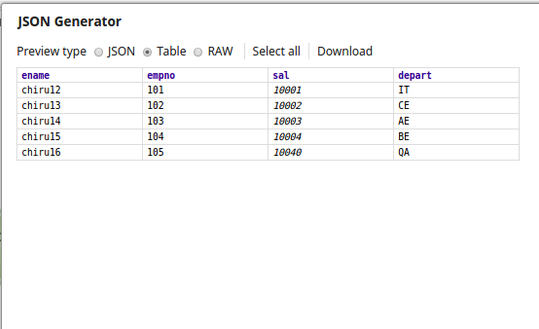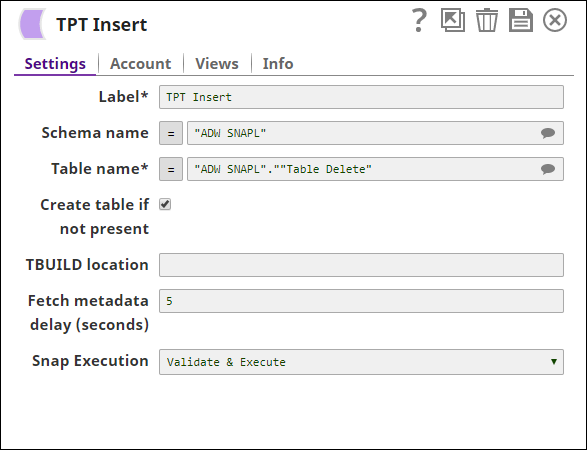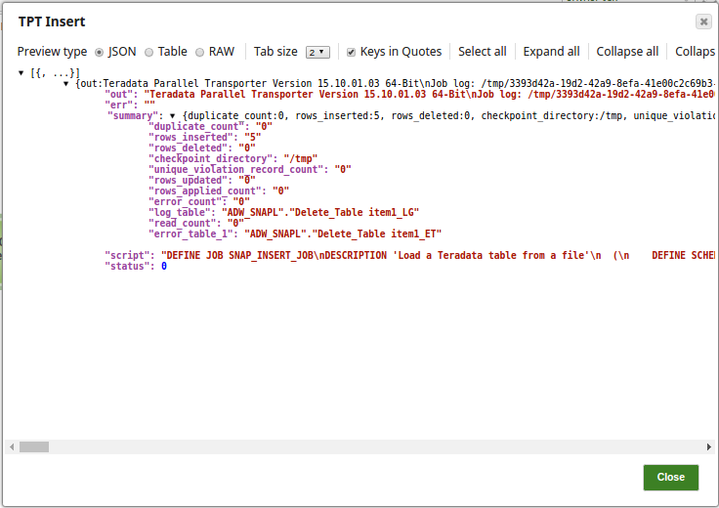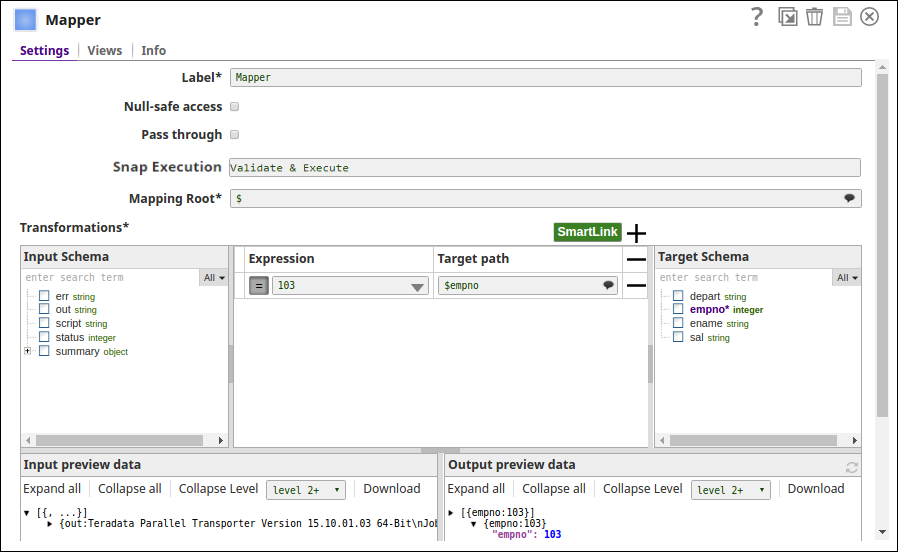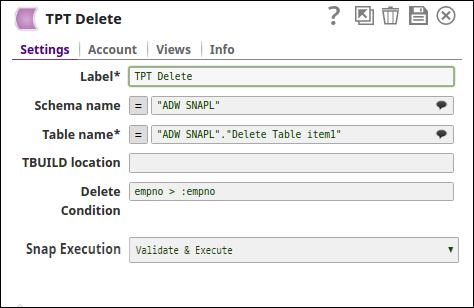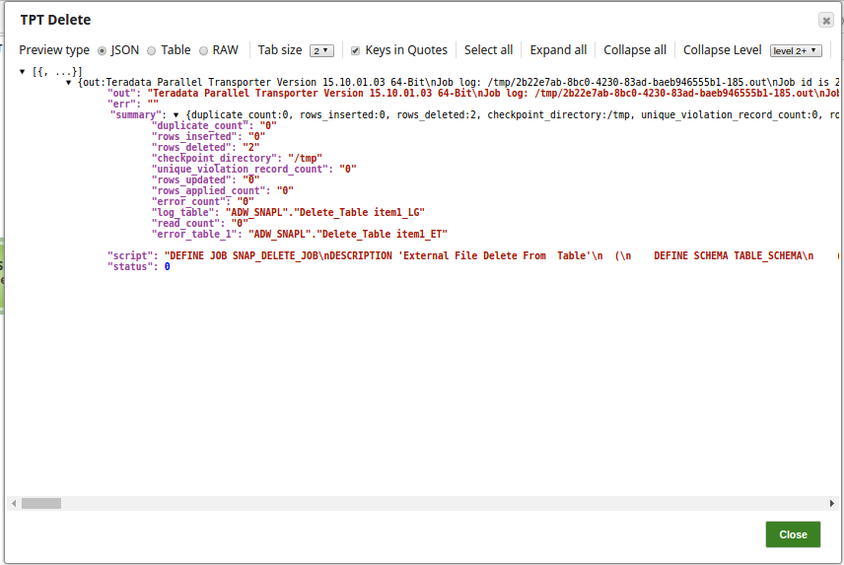TPT Delete
On this Page
Snap type: | Write | |||||||
|---|---|---|---|---|---|---|---|---|
Description: | The TPT (Teradata Parallel Transport) Delete Snap allows you to delete the data by executing the script generated using the upstream document provided by the user. The Snap deletes the table data with the values provided in the input view and using the delete condition provided in the Delete Condition property, and provides the console output, status code and summary on the output view for any downstream Snap checking for successful execution.
DELETE FROM CUSTOMER WHERE CUSTOMER_NUMBER LT 100000; Give the delete Condition as follows: empno LT : empno ( Where : empno is the place holder which internally represents $empno value coming from the upstream component) empno < :empno Allows logical operators like GE (Greater than or equals), GT (Greater than), LT (Less than), LE(Less than or equals), IS NULL, IS NOT NULL etc.. The TPT Snaps are built to handle the bulk input documents. The TPT Delete Snap is designed to execute only if there are input documents. The Snap does not to execute when there is no input document. The equalTo '=' operator is not allowed to use with a PI (Primary Index) column. However, if the table has more than one PI columns, you can use them as partial PI columns.
| |||||||
| Prerequisites: | TPT Snaps (TPT Insert, TPT Update, TPT Delete, TPT Upsert and TPT Load) uses the 'tbuild' utility for the respective operations. In order to use these Snaps in the pipelines, the respective TPT utilities should be installed/available on the Snapplexes. All the required TPT utilities must be installed on the node where JCC is running or the Snap simply executes but may not perform the operation. Any utility/library file missing on the node may cause the Snap to perform a failed operation. | |||||||
Basic steps for installing the TPT utilities: | Procedure to install the Teradata tools and utilities:
Flow: If the tbuild or fastload is already available on the OS path then the corresponding TPT Snap can invoke the required utility, however, if these binaries are not available on the OS path, then we need to provide the absolute path of the respective binary in the Snap. | |||||||
| Support and limitations: | None. | |||||||
| Account: | This Snap uses account references created on the Accounts page of SnapLogic Manager to handle access to this endpoint. See Configuring Teradata Database Accounts for information on setting up this type of account. | |||||||
| Views: |
| |||||||
Settings | ||||||||
Label | Required. The name for the Snap. You can modify this to be more specific, especially if you have more than one of the same Snap in your pipeline. | |||||||
Schema name | The database schema name. In case it is not defined, the suggestion for the table name will retrieve all the table names of all the schemas. The property is suggestible and will retrieve available database schemas during suggest values. The values can be passed using the pipeline parameters but not the upstream parameter. Example: SYS Default value: [None] | |||||||
| Table name | Required. Name of the table to insert records into. The values can be passed using the pipeline parameters but not the upstream parameter. Example: people Default value: [None] | |||||||
TBUILD Location | Location of the tbuild application. Example: /usr/bin/tbuild Default value: [None] | |||||||
Delete Condition | Delete Statement to be executed to delete the table data which matches given delete condition. If no condition specified in the Delete Condition field then entire table data will be deleted from the specified database. Please note that, due to Teradata's requirement, an equality operator '=' is not allowed with PI (Primary Index). For example, if 'empno' is a PI, "empno=:empno" will cause an error "RDBMS error 3537: A MultiLoad DELETE Statement is Invalid." Example: empno < 1000 Default value: [None] | |||||||
Snap execution | Select one of the three modes in which the Snap executes. Available options are: Disabled: Disables the Snap and all Snaps that are downstream from it. | |||||||
Example
In this pipeline, the TPT Delete Snap deletes the TPT table items by providing a delete query condition. The TPT Insert Snap inserts the values into the TPT records via the upstream JSON Generator Snap.
The upstream JSON Generator Snap supplies the values to be inserted into the records of the target TPT Table. The respective output preview is as displayed:
The TPT insert Snap inserts the values into the records of the TPT table Table Delete under the schema, ADW SNAPL. Additionally provide the Fetch metadata delay field with a time of 5secs to avoid the conflict of parallel TPT executions in the pipeline.
The output preview at the TPT Insert Snap is as displayed below:
The Mapper Snap maps the values to the target path, here, the value 103 is mapped to the column empno.
The TPT Delete Snap deletes the items from the table, "ADW_SNAPL"."Delete_Table item1" by providing the delete condition, empno > :empno which deletes all the items that have the empno greater than the value 103. Leave the Delete Condition field empty if the entire table needs to be deleted.
The successful execution of the pipeline displays the below output preview:
(Note that the two rows having the value greater than103 have been deleted from the table)
Snap Pack History
Have feedback? Email documentation@snaplogic.com | Ask a question in the SnapLogic Community
© 2017-2025 SnapLogic, Inc.

.png?version=1&modificationDate=1489648592385&cacheVersion=1&api=v2&width=450&height=402)
